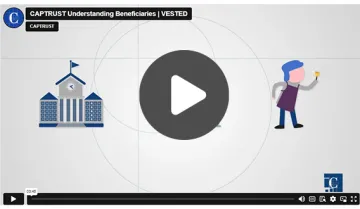What is a Beneficiary?
A beneficiary is a person or entity (such as a charitable organization or trust) legally designated to receive proceeds or benefits owned by someone else. Beneficiaries receive those proceeds or benefits when the original owner dies. Beneficiaries can be named on bank and brokerage accounts, insurance policies, and retirement accounts, such as 401(k)s and IRAs.
Accounts That Might Need a Beneficiary
- Annuities (investments issued by insurance companies) - pay out income during your lifetime. If your pay out includes a death benefit, beneficiaries receive whatever money hasn't already been distributed or a preset minimum.
- Life insurance - The purpose of a life insurance policy is to help loved ones in the event of your passing.
- Non-retirement bank and brokerage accounts - These accounts may use a Transfer on Death (TOD) registration, which passes the account along to your beneficiary.
- Retirement accounts such as a 401(k), 403(b) and Individual Retirement Accounts (IRA)
Why Beneficiaries Are Important
- If you don't name a beneficiary for your insurance and financial accounts, in the event of your passing, the money will:
- go into probate if you have a will or
- be disbursed according to state laws if you don't have a will.
Naming a beneficiary can avoid these processes and ensure that your assets are distributed according to your wishes.
- Having a beneficiary avoids confusion by clearly stating what happens to your retirement accounts and life insurance proceeds after you're gone. Keep in mind that named beneficiaries override instructions in your will. You should regularly revisit your beneficiaries, estate plans, and medical and financial legal documents, particularly if you experience any of the 6Ds: Decade, Decline, Diagnosis, Death, Divorce, and Disaster.
- Assets with designated beneficiaries can bypass probate, ensuring a smooth transfer to intended heirs. However, if the estate has outstanding debts and only assets with beneficiary designations are available, those assets may be used to settle the estate's obligations before distribution to beneficiaries.
- It could save money. Probate court isn't free. The larger the estate, the more it could cost, with fees potentially costing roughly 3-8% of its total value. By naming a beneficiary and avoiding probate, you could lower costs, leaving more behind to your loved ones.

Understanding Beneficiaries from CAPTRUST
Types of Beneficiaries
Primary
When you choose a primary beneficiary for your financial account, you are selecting who will receive all the assets in the account. Although you can also list other beneficiaries in account or estate documents, the primary beneficiary is the first choice and takes priority.
Contingent
A contingent beneficiary is someone who comes next in line to receive the benefits from an account if the primary beneficiary is not alive or can't be contacted. You can choose multiple contingent beneficiaries and specify how the assets should be divided among them.
How to Choose a Beneficiary
Beneficiaries should be designated for your important assets, including property, insurance policies, retirement accounts, brokerage accounts and more.
Many people choose the following beneficiaries:
- A spouse or long-term partner
- Adult children
- Other family members or close friends
- A trust - a legal entity that manages an inheritance on behalf of your heirs and pays out the money over time, which might be an option if you want minor children to receive assets.
- An organization you'd like to support
When selecting your beneficiaries:
- Assess your relationships with family members who may need your financial help. You may also want to consider family pets who may need your protection.
- Review those outside the family you'd like to care for or reward for loyal service through the years.
- Look at organizations you've supported and decide whether they can use your financial support.
Minor children can’t receive the proceeds of a life insurance policy directly, but you could name a trust or your children’s legal guardian as a beneficiary. Learn more about making a minor a beneficiary.
Content on this page adapted from What Is a Beneficiary? How They Work, Types, and Examples and What is a Beneficiary? From Fidelity Investments.
